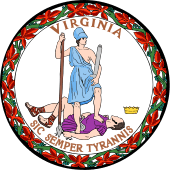Fredericksburg, Virginia
Fredericksburg is an independent city located in the Commonwealth of Virginia in the United States. As of the 2010 census, the population was 24,286,[2] an increase from 19,279 at the 2000 census. The city population was estimated at 29,144 in 2018.[6] The Bureau of Economic Analysis of the United States Department of Commerce combines the city of Fredericksburg with neighboring Spotsylvania County for statistical purposes.
Fredericksburg, Virginia | |
|---|---|
| City of Fredericksburg | |
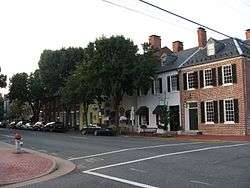 Historic downtown Fredericksburg | |
 Flag  Seal  Coat of arms | |
| Motto(s): America's Most Historic City | |
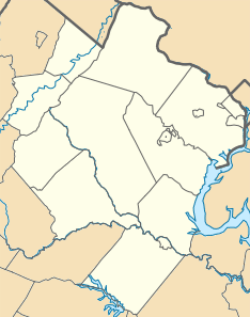 Fredericksburg, Virginia 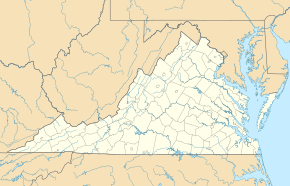 Fredericksburg, Virginia  Fredericksburg, Virginia | |
| Coordinates: 38°18′6.5″N 77°28′15″W | |
| Country | United States |
| State | Commonwealth of Virginia |
| County | None (Independent city since 1879, adjacent to Spotsylvania County) |
| Founded | 1728 |
| Incorporated | 1781 |
| Government | |
| • Mayor | Mary Katherine Greenlaw |
| Area | |
| • Independent city | 10.52 sq mi (27.24 km2) |
| • Land | 10.45 sq mi (27.07 km2) |
| • Water | 0.07 sq mi (0.18 km2) |
| Elevation | 59 ft (18 m) |
| Population | |
| • Independent city | 24,286 |
| • Estimate (2019)[3] | 29,036 |
| • Density | 2,300/sq mi (890/km2) |
| • Urban | 141,238 (US: 231st) |
| Time zone | UTC−05:00 (Eastern (EST)) |
| • Summer (DST) | UTC−04:00 (EDT) |
| ZIP Codes | 22401–22405 (5 total) |
| Area code(s) | 540 |
| FIPS code | 51-29744[4] |
| GNIS feature ID | 1494947[5] |
| Website | www |
| * Independent from Spotsylvania County in 1879 | |
Fredericksburg is located 53 miles (85 km) south of Washington, D.C. and 58 miles (94 km) north of Richmond.[7] Fredericksburg is a part of Northern Virginia and is in the Baltimore-Washington Metropolitan Area.
Located near where the Rappahannock River crosses the Atlantic Seaboard fall line, Fredericksburg was a prominent port in Virginia during the colonial era. During the Civil War, Fredericksburg, located halfway between the capitals of the opposing forces, was the site of the Battle of Fredericksburg and Second Battle of Fredericksburg. These battles are preserved, in part, as the Fredericksburg and Spotsylvania National Military Park. More than 10,000 African-Americans in the region left slavery for freedom in 1862 alone, getting behind Union lines. Tourism is a major part of the economy, with approximately 1.5 million people visiting the Fredericksburg area annually, including the battlefield park, the downtown visitor center, events, museums, and historic sites.[8]
Fredericksburg is home to several major retail and commercial centers including Central Park (as of 2004, the second-largest mall on the East Coast) and the Spotsylvania Towne Centre, located in Spotsylvania County adjacent to the city. Major employers include the University of Mary Washington, Mary Washington Healthcare, and GEICO. Many Fredericksburg-area residents commute to work by car, bus, and rail to Washington D.C. and Richmond, as well as Fairfax, Prince William, and Arlington counties.[9][10][11][12]
History
At the time of European encounter, the indigenous inhabitants of the area that became Fredericksburg were a Siouan-speaking tribe called the Manahoac. English colonists recorded the name of the Manahoac village there as Mahaskahod.[13] Siouan tribes occupied much of the area of the Piedmont. The Tidewater areas of the coastal plain had primarily Algonquian-speaking tribes making up the Powhatan Confederacy.
Colonial
Located on the Rappahannock River near the head of navigation at the fall line, Fredericksburg developed as the frontier of colonial Virginia shifted west from the coastal plain into the Piedmont. The land on which the city was founded was part of a tract patented in 1671. The Virginia General Assembly established a fort on the Rappahannock in 1676, just downriver of the present-day city. In 1714, Lieutenant Governor Alexander Spotswood sponsored a German settlement called Germanna on the Rapidan River, a tributary of the Rappahannock upstream from the future site of the city. In 1716, he led an exploratory expedition westward over the Blue Ridge Mountains.
As interest in the frontier grew, the colonial assembly formed Spotsylvania County in 1720, named after Royal Lieutenant Governor Alexander Spotswood. In 1728, Fredericksburg was declared a port for the county, of which it was then a part. Named for Frederick, Prince of Wales,[14] son of King George II, the colonial town named its streets after the members of the royal family. The county court was moved to Fredericksburg in 1732. Hence, the community served as county seat until 1780. The court was then moved to Spotsylvania Courthouse, Virginia – closer to the geographical center of Spotsylvania County. In 1781, Fredericksburg was incorporated as a town, with its own court, council, and mayor. It received its charter as an independent city in 1879, and under Virginia law was separated from Spotsylvania County. The city adopted its present city manager/council form of government in 1911.
The city has close associations with George Washington, whose family in 1738 moved to Ferry Farm in Stafford County near the Rappahannock River opposite Fredericksburg. Washington's mother Mary later moved to the city, and his sister Betty lived at Kenmore, a plantation house then outside the city. Several citizens played active roles during the American Revolution (1763–1781). For example, a number of locals signed the Leedstown Resolves, which formed an association to protest the Stamp Act in the 1760s.[15] In the 1770s, Fielding Lewis, owner of Kenmore Plantation and brother-in-law to George Washington, also operated an arms factory for the Continental Army. Other significant early residents include the Revolutionary War generals Hugh Mercer and George Weedon, naval war hero John Paul Jones, and future U.S. president James Monroe. Thomas Jefferson wrote the Virginia Statute for Religious Freedom in Fredericksburg.
19th century
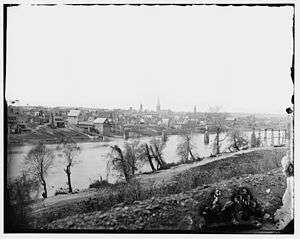
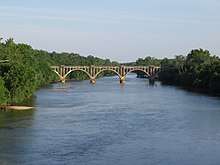
During the 19th century, mills continued to be developed along the Rapahannock River, which provided water power. There were mills for grinding flour, processing and weaving cotton, and other manufacturing. Fredericksburg sought to maintain its sphere of trade, but with limited success. It promoted the development of a canal on the Rappahannock and construction of a turnpike and plank road to bind the interior country to the market town. By 1837, a north–south railroad, which became the Richmond, Fredericksburg and Potomac Railroad, linked the town to Richmond, the state capital. A much-needed railroad joining the town to the farming region to the west was not finished until after the Civil War.
During the Civil War, Fredericksburg was strategically important because of its port location midway between Washington and Richmond, the opposing capitals of the Union and the Confederacy. During the Battle of Fredericksburg from December 11–15, 1862, the town sustained significant damage from bombardment and looting by the Union forces.
During that engagement, nearly 10,000 slaves left area plantations and city households to gain freedom by crossing the Rappahannock River to Stafford County and join the Union lines, part of a movement by slaves throughout the South in wartime.[16] John Washington, a literate slave who shortly crossed to freedom, wrote later about people watching the approach of Union troops across the river from Fredericksburg: "No one could be seen on the street but the colored people. and every one of them seemed to be in the best of humors."[17]
A Second Battle of Fredericksburg was fought in and around the town on May 3, 1863, in connection with the Chancellorsville campaign (April 27, 1863 – May 6, 1863). The battles of the Wilderness and Spotsylvania Court House were fought nearby in May 1864. The Washington Woolen Mill, a large three-story building, was converted to use as a hospital during the war.
After the war, Fredericksburg recovered its former position as a center of local trade and slowly grew beyond its prewar boundaries. Neither the city of Fredericksburg, nor either of the surrounding counties, reached the 1860 level of population again until well into the 20th century. After the war, many freedmen moved to Richmond and Petersburg, where there had been established free black communities before the war, and there was more work.
20th century to present
In the early 20th century, as the Jim Crow era continued in the South, there was widespread population movement. Many African-Americans left rural areas of the South for work and other opportunities in industrial cities of the North and Midwest in the Great Migration. Some settled in Washington, D.C., where there were more opportunities, or further north.
War-related buildup at defense facilities for World War II added to area population in the 1940s. The 1960s brought renewed growth and development, fueled by the construction of Interstate 95, which eased access for commuting and trade. By the 1970s, the city and the area had become a bedroom community for jobs in Northern Virginia and Washington, D.C.. Headquarters agencies, lobbyists, consultants, defense and government contractors, and a range of other businesses were part of the regional economy influenced by the U.S. government. The city also benefited by its relative proximity to four military installations: the United States Marine Corps' Quantico Base, the U.S. Army's Fort Belvoir, the U.S. Navy's Dahlgren Surface Weapons Base, and the Virginia National Guard's Fort A.P. Hill.
The University of Mary Washington was founded in Fredericksburg in 1908 as the State Normal and Industrial School for Women, to train white women for teaching K-12 and industrial skills. Adopting the name of Mary Washington College in 1938, the college was for many years associated with the University of Virginia (then limited to white men) as a women's liberal arts college. The college became independent of the University of Virginia and began to accept men in 1970. In 2004, the college changed names from Mary Washington College to the University of Mary Washington. Two additional campuses for graduate and professional studies and education and research are located in Stafford County and in King George County, respectively.
Musician Link Wray of Fredericksburg developed the power chord of modern rock guitar in 1958 during his first improvisation of the instrumental piece "Rumble", a single released by Wray & His Ray Men.[18] This innovation became widely used by rock guitarists. In the early 21st century, the local music scene includes a wide variety of genres.
A commuter rail line – the Virginia Railway Express – was established in the 1980s, providing passage to Washington, D.C. and other cities north of Fredericksburg.
The city has become the regional healthcare center for the area. Retail, real estate, and other commercial growth exploded in the early 21st century, eventually slowing during the "Great Recession" beginning in 2007.
Geography and climate

According to the United States Census Bureau, the city has a total area of 10.5 square miles (27.2 km2), of which 10.4 square miles (27.0 km2) is land and 0.1 square miles (0.2 km2), or 0.67%, is water.[19] The city is part of the boundary between the Piedmont and Tidewater regions, and as such is located on the fall line, as evident on the Rappahannock River. US 1, US 17, and I-95 all pass through the city, which is located 53 miles (85 km) south of downtown Washington, D.C.
The city is bounded on the north and east by the Rappahannock River; across the river is Stafford County. The city is bounded on the south and west by Spotsylvania County.
Fredericksburg has a four-season humid subtropical climate (Köppen Cfa), with cool winters and hot, humid summers. Daytime temperatures for much of the year average slightly higher than in Washington, D.C. due to the southerly aspect, although the inland location and distance from the urban heat island present in the nation's capital make for significantly cooler low temperatures.
| Climate data for Fredericksburg, Virginia (downtown, 1981−2010 normals) | |||||||||||||
|---|---|---|---|---|---|---|---|---|---|---|---|---|---|
| Month | Jan | Feb | Mar | Apr | May | Jun | Jul | Aug | Sep | Oct | Nov | Dec | Year |
| Average high °F (°C) | 45.3 (7.4) |
48.7 (9.3) |
56.9 (13.8) |
67.5 (19.7) |
75.9 (24.4) |
84.5 (29.2) |
87.8 (31.0) |
86.5 (30.3) |
80.0 (26.7) |
69.9 (21.1) |
59.4 (15.2) |
49.0 (9.4) |
67.7 (19.8) |
| Average low °F (°C) | 24.3 (−4.3) |
26.1 (−3.3) |
33.2 (0.7) |
43.0 (6.1) |
52.4 (11.3) |
62.5 (16.9) |
67.1 (19.5) |
65.7 (18.7) |
58.0 (14.4) |
44.9 (7.2) |
35.6 (2.0) |
27.3 (−2.6) |
45.1 (7.3) |
| Average precipitation inches (mm) | 2.90 (74) |
2.51 (64) |
3.99 (101) |
3.35 (85) |
4.08 (104) |
3.97 (101) |
4.53 (115) |
3.39 (86) |
4.32 (110) |
3.38 (86) |
3.75 (95) |
3.18 (81) |
43.35 (1,102) |
| Average precipitation days (≥ 0.01 in) | 9.5 | 10.1 | 11.4 | 11.7 | 12.5 | 10.2 | 13.1 | 10.0 | 9.4 | 8.8 | 9.8 | 11.2 | 127.7 |
| Source: NOAA (precipitation days at Fredericksburg National Battlefield Park)[20][21] | |||||||||||||
Demographics
| Historical population | |||
|---|---|---|---|
| Census | Pop. | %± | |
| 1830 | 3,308 | — | |
| 1840 | 3,974 | 20.1% | |
| 1850 | 4,061 | 2.2% | |
| 1860 | 5,022 | 23.7% | |
| 1870 | 4,046 | −19.4% | |
| 1880 | 5,010 | 23.8% | |
| 1890 | 4,528 | −9.6% | |
| 1900 | 5,068 | 11.9% | |
| 1910 | 5,874 | 15.9% | |
| 1920 | 5,882 | 0.1% | |
| 1930 | 6,819 | 15.9% | |
| 1940 | 10,066 | 47.6% | |
| 1950 | 12,158 | 20.8% | |
| 1960 | 13,639 | 12.2% | |
| 1970 | 14,450 | 5.9% | |
| 1980 | 15,322 | 6.0% | |
| 1990 | 19,027 | 24.2% | |
| 2000 | 19,279 | 1.3% | |
| 2010 | 24,286 | 26.0% | |
| Est. 2019 | 29,086 | [3] | 19.8% |
| U.S. Decennial Census[22] 1790–1960[23] 1900–1990[24] 1990–2000[25] | |||
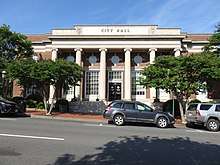
As of the census[26] of 2000, there were 19,279 people, 8,102 households, and 3,925 families residing in the city. The population density was 1,833.0 inhabitants per square mile (707.7/km2). There were 8,888 housing units at an average density of 845.0 per square mile (326.3/km2). The racial makeup of the city was 73.18% White, 20.41% Black or African American, 0.34% Native American, 1.51% Asian, 0.06% Pacific Islander, 2.56% from other races, and 1.95% from two or more races. 4.90% of the population were Hispanic or Latino of any race.
There were 8,102 households out of which 21.6% had children under the age of 18 living with them, 31.8% were married couples living together, 13.1% had a female householder with no husband present, and 51.6% were non-families. 39.2% of all households were made up of individuals and 12.8% had someone living alone who was 65 years of age or older. The average household size was 2.09 and the average family size was 2.81.
In the city, the population was spread out with 17.8% under the age of 18, 23.8% from 18 to 24, 27.2% from 25 to 44, 18.4% from 45 to 64, and 12.8% who were 65 years of age or older. The median age was 30 years. For every 100 females, there were 81.8 males. For every 100 females age 18 and over, there were 78.4 males.
The median income for a household in the city was $34,585, and the median income for a family was $47,148. Males had a median income of $33,641 versus $25,037 for females. The per capita income for the city was $21,527. 15.5% of the population and 10.4% of families were below the poverty line. Out of the total population, 19.9% of those under the age of 18 and 8.8% of those 65 and older were living below the poverty line.
Crime
The Fredericksburg Police Department[27] tracks crime information under the state-level system of the Uniform Crime Reporting program.[note 1] Per state code, the central repository for crime statistics rests with the Department of State Police, which compiles data from all of the participating agencies into an annual publication.[28]
Politics
By long-standing tradition (dating back to the Federal Hatch Act of 1939, which prohibited government employees from participating in partisan politics), local elections in Fredericksburg are officially non-partisan. Neither the mayoral and council elections nor local constitutional positions (e.g. sheriff, Commissioner of Revenue, Commonwealth Attorney) list candidates with a party label.
Like the rest of Northern Virginia, Fredericksburg has trended strongly Democratic in the early 21st century. In the 2008 presidential election, voters in Fredericksburg gave Barack Obama a total of 63.6% of the vote.[29] Only Arlington County, Alexandria, and Falls Church in Northern Virginia had a higher percentage of votes for Obama.[30] According to Dave Leip's Atlas of U.S. Presidential Elections, no Republican presidential candidate has carried Fredericksburg since 1988. Additionally, in the 2016 presidential election, then-candidate Donald Trump garnered the lowest percentage of the city's vote of any Republican candidate since 1936.
Mayor Mary Katherine Greenlaw won election in 2012[31] and was reelected in 2016.[32]
| Year | Republican | Democratic | Third Parties |
|---|---|---|---|
| 2016 | 33.3% 3,744 | 59.6% 6,707 | 7.2% 806 |
| 2012 | 35.5% 4,060 | 62.4% 7,131 | 2.2% 246 |
| 2008 | 35.3% 3,413 | 63.6% 6,155 | 1.1% 109 |
| 2004 | 45.0% 3,390 | 54.2% 4,085 | 0.9% 67 |
| 2000 | 43.9% 2,935 | 50.3% 3,360 | 5.8% 386 |
| 1996 | 41.8% 2,579 | 52.2% 3,215 | 6.0% 370 |
| 1992 | 41.0% 2,819 | 47.5% 3,266 | 11.5% 794 |
| 1988 | 55.3% 3,401 | 43.6% 2,683 | 1.1% 70 |
| 1984 | 58.6% 3,500 | 40.8% 2,439 | 0.6% 34 |
| 1980 | 50.4% 2,502 | 43.8% 2,174 | 5.9% 292 |
| 1976 | 49.1% 2,527 | 49.5% 2,550 | 1.4% 73 |
| 1972 | 64.5% 3,211 | 34.2% 1,702 | 1.3% 63 |
| 1968 | 42.3% 2,142 | 40.2% 2,036 | 17.6% 890 |
| 1964 | 38.5% 1,511 | 61.4% 2,410 | 0.2% 7 |
| 1960 | 53.7% 1,566 | 45.5% 1,326 | 0.8% 23 |
| 1956 | 60.3% 1,672 | 33.7% 934 | 6.1% 169 |
| 1952 | 61.2% 1,536 | 38.7% 970 | 0.2% 4 |
| 1948 | 42.0% 810 | 42.3% 816 | 15.8% 305 |
| 1944 | 38.9% 698 | 60.9% 1,092 | 0.2% 3 |
| 1940 | 33.4% 522 | 66.3% 1,037 | 0.4% 6 |
| 1936 | 30.3% 411 | 69.6% 944 | 0.2% 2 |
| 1932 | 30.7% 366 | 68.2% 812 | 1.1% 13 |
| 1928 | 54.0% 697 | 46.0% 594 | |
| 1924 | 27.6% 223 | 69.0% 558 | 3.5% 28 |
| 1920 | 33.5% 299 | 65.1% 581 | 1.5% 13 |
| 1916 | 31.2% 173 | 68.6% 380 | 0.2% 1 |
| 1912 | 9.0% 51 | 73.1% 414 | 17.9% 101 |
Culture and recreation
Architecture and historic sites
Fredericksburg Historic District | |
Virginia Landmarks Register | |
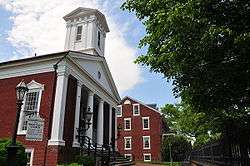 | |
| Location | Roughly bounded by Rappahannock River, Hazel Run, Prince Edward and Canal Sts., Fredericksburg, Virginia |
|---|---|
| Area | 200 acres (81 ha) |
| NRHP reference No. | 71001053 [33] |
| VLR No. | 111-0132 |
| Significant dates | |
| Added to NRHP | September 22, 1971 |
| Designated VLR | March 2, 1971[34] |
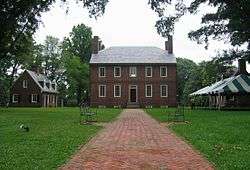
Despite recent decades of suburban growth, reminders of the area's past abound. The 40-block Fredericksburg Historic District, listed on the National Register of Historic Places, embraces the city's downtown area and contains more than 350 buildings and locations dating to the 18th and 19th centuries, including the Fredericksburg Town Hall and Market Square, Lewis Store, and the historical Slave Auction Block. Crowds of tourists are attracted to the historic district of Fredericksburg during the summer months.
Within the historic district, four 18th-century historic sites have been managed by the "Washington Heritage Museums": the Mary Washington House, where George Washington's mother lived in her final years; the late 18th-century Rising Sun Tavern, and the Hugh Mercer Apothecary Shop (the fourth, the St. James House (built 1768), is open to the public only during Historic Garden Week). Important public buildings include the 1852 courthouse designed by James Renwick, whose works include the Smithsonian Institution's castle building in Washington and St. Patrick's Cathedral in New York City; and the 1816 town hall and market house, now operated as the Fredericksburg Area Museum and Cultural Center. Another site of interest is St. George's Church. The James Monroe Museum and Memorial Library is located on the site where Monroe practiced law from 1786 to 1788. The museum is housed in a building made up of three individual structures, constructed at different times, beginning in 1816.
Near the historic district is the Lewis Plantation, later named Kenmore, the plantation home of George Washington's sister Betty and her husband, patriot Fielding Lewis.
The area's Civil War battles are commemorated in Fredericksburg and Spotsylvania National Military Park. Formed by an act of Congress in 1927, the national military park preserves portions of the battlefields of Fredericksburg, Chancellorsville, the Wilderness, and Spotsylvania Court House. The Fredericksburg National Cemetery, also part of the park, was developed by the federal government after the war on Marye's Heights on the Fredericksburg battlefield. It contains more than 15,000 Union burials from the area's battlefields. Many unidentified soldiers were buried in mass graves.
Among the 10,000 slaves crossing the Rappahannock for freedom with the Union in 1862 was John Washington. A literate slave from Fredericksburg, he settled in New York and wrote an account of the wartime events several years later. His manuscript was discovered in the 1990s. It was published as the basis of two books, David W. Blight's A Slave No More (2007), and John Washington's Civil War: A Slave Narrative (2008), edited by Crandall Shifflett.[35] In 2010, the National Park Service, which manages the battlefield, Stafford County, and the City of Fredericksburg worked collaboratively to post new historical markers on either side of the Rappahannock River as part of a "Freedom Trail" to mark this exodus.[16]
Notable 20th-century sites and structures include the campus of the University of Mary Washington (begun in 1908), and Carl's Ice Cream, an Art Moderne roadside ice cream stand, listed on the National Register of Historic Places.
Nearby points of interest include Ferry Farm historic site across the Rapahannock in Stafford County where Washington spent his boyhood, and the George Washington Birthplace National Monument, located 38 miles to the east in Westmoreland County on the Northern Neck. The historic community of Falmouth lies across the Rappahannock to the north and includes the historic house Belmont, home of American Impressionist artist Gari Melchers.
Parks
Public parks run by the city include:[36]
- Old Mill Park
- Alum Spring Park[37]
- Hurkamp Park
- Dixon Park
Public Library
Central Rappahannock Regional Library
Education
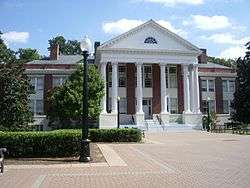
Primary and secondary schools
The Fredericksburg City Public Schools are run independently of the surrounding counties. The public primary and secondary schools include:[38]
- James Monroe High School
- Walker-Grant Middle School
- Hugh Mercer Elementary School
- Lafayette Upper Elementary School
Private schools include:
- Fredericksburg Academy
- Fredericksburg Christian School
- Saint Michael the Archangel High School
- Lighthouse Academy
Higher education
The University of Mary Washington, established in 1908 and opening in 1911, is a four-year public university within the city.
Media
Fredericksburg's daily newspaper is The Free Lance–Star. The Free Lance was first published in 1885, and competed with two twice-weekly papers in the city during the late 19th century, the Fredericksburg News and The Virginia Star. While the News folded in 1884, the Star moved to daily publication in 1893. In 1900, the two companies merged, with both newspapers continuing publication until 1926, when they merged as a single daily newspaper under the current title. Until June 19, 2014, the Free Lance–Star was owned and operated by members of the Rowe family of Fredericksburg. At that time, Sandton Capital Partners purchased the paper. On December 31, 2015 the newspaper and associated website were purchased by Berkshire Hathaway′s BH Media Group.[39] Fredericksburg.Today, an online hyperlocal news site began operation following the 2014 bankruptcy of The Free Lance–Star.[40]
Fredericksburg and the nearby region have several radio stations, including (on the FM dial) WLJV (89.5, Contemporary Christian), WPER (90.5, Christian), WFLS (93.3, country), WGRQ (95.9, "SuperHits", licensed to nearby Fairview Beach), WWUZ (96.9, classic rock, licensed to nearby Bowling Green), WVBX (99.3, "The Vibe", rhythmic contemporary, licensed to nearby Spotsylvania), WBQB ("B-101.5", adult contemporary) and WGRX ("Thunder 104.5", country, licensed to nearby Falmouth). Fredericksburg AM stations include WFVA (1230, nostalgia) and WNTX (1350, talk, news, and sports). WGRQ and WGRX are owned locally by Telemedia Broadcasting. WFLS, WWUZ, WVBX, and WYSK are owned by Alpha Media.
In 2001, the Arbitron media service began listing the Fredericksburg area as a nationally rated radio market. As of the fall of 2014, the area ranked 146th out of 272 markets surveyed, with a total market population of more than 325,000. Large broadcast companies like Clear Channel Communications and Cumulus Broadcasting are not active in the local market; almost all of its stations remain locally or regionally owned.
In television, Fredericksburg is part of the Washington market. One local television station, NBC affiliate WHFV, was briefly on the air in the 1970s.
Sports
The Fredericksburg Nationals minor league baseball team are building a new stadium in Fredericksburg to open in April 2020.[41][42]
Sports at the secondary education level are run through the Virginia High School League. On the collegiate level are the University of Mary Washington Eagles. Other amateur athletics include Fredericksburg FC of the National Premier Soccer League (NPSL); and the Rappahannock Rugby Club, a senior men's rugby club competing in Division III of the Potomac Rugby Union.
Transportation

Fredericksburg is traversed by a series of rural and suburban four-lane highways and a multitude of small, two-lane roads. Among the major arterial roads is U.S. Route 1, providing north–south transportation from the region to Stafford County,[43] Washington, D.C., and points beyond. Route 3 (Plank Road) is a major east–west route that connects downtown Fredericksburg (via the Blue and Gray Parkway bypass), southern Stafford and King George counties, and Route 301 to the east with the large shopping centers, Spotsylvania Town Center and Central Park. To the west, Route 3 reaches Culpeper, where it meets Route 29 and Route 15.

Most of Fredericksburg's traffic flow is to or from the north (Washington, D.C. metropolitan area) during peak commuting hours, primarily via Interstate 95 and U.S. Route 1. The Route 1 bridge over the Rappahannock River is often a traffic bottleneck, and Route 3 has become increasingly congested as residential development grows and the location of major regional shopping centers.
Fredericksburg Regional Transit (FRED) is a bus service that started in 1996 in Fredericksburg and serves most area communities, retail shopping centers, two VRE stations, and downtown Fredericksburg.[44]
Commute
As an alternative to I-95, some commuters use the Virginia Railway Express rail service to Washington. Long-distance rail service is available on Amtrak, which serves Fredericksburg via the Northeast Regional and Carolinian/Piedmont routes.
Notable people
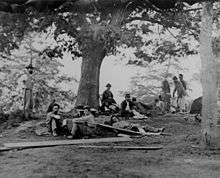
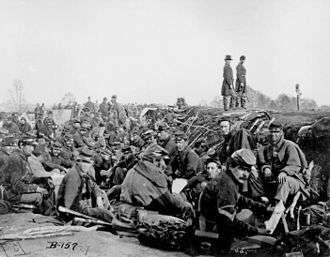
18th century and before
- Lewis Craig (brother of Elijah Craig), Baptist preacher imprisoned for religious freedom issues before the American Revolution, leader of The Travelling Church that migrated to Kentucky (see History of Baptists in Kentucky)[45]
- Henry Crist, former Congressman from Kentucky [46]
- John Paul Jones, American naval commander[47]
- Fielding Lewis, brother-in-law of George Washington[48]
- Elizabeth "Betty" Washington, sister of George Washington[49]
- Hugh Mercer, soldier and physician[50]
- James Monroe, fifth President of the United States[51]
- Augustine Washington, father of George Washington[52]
- George Washington, first President of the United States, leader of the American Revolutionary War[53]
- Mary Ball Washington, mother of George Washington[54]
- George Weedon, brigadier general in the Continental Army[55]
19th century to present
- Oliver Ackermann, guitarist and vocalist for A Place to Bury Strangers[56]
- Daniel Bachman, American primitive guitarist.[57]
- Urbane F. Bass, doctor and Army officer during WWI[58]
- Julien Binford, artist[59]
- Al Bumbry, baseball player[60]
- Jermon Bushrod, NFL player drafted by the New Orleans Saints (125th pick) in 2007 draft[61]
- Caressa Cameron, Miss America 2010[62]
- George Coghill, retired defensive back for the Denver Broncos[63]
- James L. Farmer, Jr., civil rights leader[64]
- Bessie Alexander Ficklen (1861–1945), writer, poet, artist
- Derek Hartley, radio show host[65]
- Kelvin Jones, professional soccer player[66]
- Mark Lenzi, Olympic diver and gold medalist[67]
- John Maine, New York Mets starting pitcher[68]
- Danny McBride, actor[69]
- Erin McKeown, musician[70]
- Margaret Prior (1773–1842), American humanitarian, missionary, moral reform worker, writer
- George C. Rawlings, Virginia House of Delegates[71]
- Judge Reinhold, actor[72]
- Jack Rose, musician[73]
- Jeff Rouse, Olympic swimmer, gold medalist and former world record holder[74]
- Dave Smalley, musician, member of All, Dag Nasty, Down by Law, The Sharpshooters[75]
- Torrey Smith, NFL football player[76]
- William P. Taylor, Congressman[77]
- Keller Williams, musician[78]
- Monty Williams, basketball player[79]
Sister cities
Footnotes
- The Uniform Crime Reporting program was developed and is administered by the Federal Bureau of Investigation. It provides a nationwide view of crime based on the submission of statistical data from law enforcement agencies across the country. The crime information is collected under the National Incident Based Reporting System format
- Sometimes mistakenly labeled as taken in the field after the Battle of Chancellorsville, May 2, 1863.
- Sometimes mistakenly labeled as taken at siege of Petersburg, Virginia.
References
- "2018 U.S. Gazetteer Files". United States Census Bureau. Retrieved February 16, 2020.
- "Geographic Identifiers: 2010 Demographic Profile Data (G001): Fredericksburg city, Virginia". U.S. Census Bureau, American Factfinder. Retrieved October 20, 2016.
- "Population and Housing Unit Estimates". Retrieved April 1, 2020.
- "U.S. Census website". United States Census Bureau. Retrieved January 31, 2008.
- "US Board on Geographic Names". United States Geological Survey. October 25, 2007. Retrieved January 31, 2008.
- "Population and Housing Unit Estimates". Retrieved June 4, 2019.
- "Distance between Richmond, VA and Washington, DC". www.distance-cities.com. Retrieved March 22, 2019.
Fredericksburg, VA, situated 58.27 miles from Richmond, VA and 52.71 miles from Washington, DC.
- "Fredericksburg, VA - Official Website - Official Website". www.fredericksburgva.gov.
- Owen, Karen (May 11, 2008). "Are we Northern Virginia?". The Free Lance–Star. Archived from the original on May 27, 2012. Retrieved October 24, 2008.
- Kelly, Matthew (May 11, 2008). "We can avoid the circle of Hell". The Free Lance–Star. Archived from the original on May 27, 2012. Retrieved October 24, 2008.
- Connors, Hap (May 11, 2008). "A 'tweener': We must play smart". The Free Lance–Star. Archived from the original on May 27, 2012. Retrieved October 24, 2008.
- Farley, Catherine A. (May 11, 2008). "Robert E. Lee might not recognize the place". The Free Lance–Star. Archived from the original on May 27, 2012. Retrieved October 24, 2008.
- Swanton, John R. (1952), The Indian Tribes of North America, Smithsonian Institution, pp. 61–62, ISBN 0-8063-1730-2, OCLC 52230544
- Gannett, Henry (1905). The Origin of Certain Place Names in the United States. Govt. Print. Off. pp. 131.
- "The Leedstown Resolves (also known as the Westmoreland Resolves)" (PDF). Part of a lesson plan. Road to Revolution: Northern Neck Roads and Waterways. The Menokin Foundation. February 27, 1766. Retrieved January 24, 2019 – via American University EdSpace.
- "Trail of Freedom", Rappahannock River Heritage Trail, University of Mary Washington blog
- "Freedom Just Ahead: The War Within the Civil War", New York Times, December 5, 2007; accessed November 2, 2017
- Harrington, Richard (November 22, 2005). "Prophet of the Rock Guitar". The Washington Post. Retrieved October 24, 2008.
- "US Gazetteer files: 2010, 2000, and 1990". United States Census Bureau. February 12, 2011. Retrieved April 23, 2011.
- "Station Name: VA FREDERICKSBURG SEWAGE". National Oceanic and Atmospheric Administration. Retrieved February 28, 2013.
- "Station Name: VA FREDERICKSBURG NP". National Oceanic and Atmospheric Administration. Retrieved February 28, 2013.
- "U.S. Decennial Census". United States Census Bureau. Retrieved January 6, 2014.
- "Historical Census Browser". University of Virginia Library. Retrieved January 6, 2014.
- "Population of Counties by Decennial Census: 1900 to 1990". United States Census Bureau. Retrieved January 6, 2014.
- "Census 2000 PHC-T-4. Ranking Tables for Counties: 1990 and 2000" (PDF). United States Census Bureau. Retrieved January 6, 2014.
- "U.S. Census website". United States Census Bureau. Retrieved May 14, 2011.
- "Fredericksburg, VA - Official Website - Police". www.fredericksburgva.gov. Retrieved March 2, 2018.
- "Virginia State Police - Crime in Virginia Publication". www.vsp.virginia.gov.
- "Dave Leip's Atlas of U.S. Presidential Elections". uselectionatlas.org.
- "2008 Presidential Election Results By County". The New York Times. December 9, 2008. Retrieved April 6, 2012.
- Sidersky, Robyn (May 1, 2012). "Greenlaw, Kelly, Devine win Fredericksburg elections". The Free Lance-Star. The Free Lance-Star Publishing. Archived from the original on March 24, 2014. Retrieved March 24, 2014.
- "Mary Katherine Greenlaw wins a second term as Fredericksburg mayor". Fredericksburg.com. Retrieved May 27, 2016.
- "National Register Information System". National Register of Historic Places. National Park Service. July 9, 2010.
- "Virginia Landmarks Register". Virginia Department of Historic Resources. Archived from the original on September 21, 2013. Retrieved March 19, 2013.
- John Washington's Civil War, ed. Crandall Shifflett, Louisiana State University Press, 2008
- "map of parks in Fredericksburg VA" (PDF). Fredericksburg City Parks and Recreation. Archived from the original (PDF) on June 22, 2011. Retrieved July 28, 2011.
- Crookshanks, Barbara (October 28, 2004). "Alum Spring Park: A Walk Through History". Historypoint.org. The Central Rappahannock Regional Library. Archived from the original on November 13, 2004.
- "homepage". Fredericksburg City Public Schools. Retrieved July 28, 2011.
- "Berkshire Hathaway Buys Newspaper in Fredericksburg, Virginia". Bloomberg News. December 31, 2015. Retrieved January 4, 2016.
- "Patch Lays off Hundreds, Shuttered Editor to Start Indie News Site". PotomacLocal.com. January 30, 2014. Retrieved January 4, 2016.
- Hambrick, Greg (June 26, 2018). "Potomac Nationals announce plans for Fredericksburg stadium". InsideNoVa.com. Retrieved June 27, 2018.
- Jett, Cathy (November 13, 2018). "Fredericksburg finalizes $35 million stadium deal with Potomac Nationals' owners". The Free Lance–Star. Retrieved January 31, 2019.
- "Stafford County, VA - Official Website | Official Website". staffordcountyva.gov. Retrieved March 2, 2018.
- "Fredericksburg Regional Transit - Transit Development Plant FY 2017 - FY 2022" (PDF). Virginia Department of Rail and Public Transportation. May 2017. Retrieved March 25, 2019.
- "For Area Baptists: The First Hundred Years Were the Hardest". Town & County. The Free Lance-Star. 83 (272). November 8, 1967. p. A-3. Retrieved July 1, 2016.
- United States Congress. "Fredericksburg, Virginia (id: C000910)". Biographical Directory of the United States Congress.
- "John Paul Jones wins in English waters". history.com. A&E Television Networks. Retrieved April 18, 2017.
lived for a time in Fredericksburg, Virginia, where his brother had a business
- "Fielding Lewis (1725–1781 or 1782)". encyclopediavirginia.org. Virginia Foundation for the Humanities. Retrieved April 18, 2017.
he moved to Fredericksburg in the 1740s
- "Betty Washington Lewis". The George Washington Foundation. Retrieved April 18, 2017.
Upon her marriage, Betty moved into a large brick house in Fredericksburg
- "Hugh Mercer dies from wounds received in Battle of Princeton". history.com. A&E Television Networks. Retrieved April 18, 2017.
Mercer worked as an apothecary and practiced medicine in Fredericksburg
- "James Monroe Museum and Memorial Library | James Monroe Museum and Memorial Library Home Page". Umw.edu. Archived from the original on May 27, 2010. Retrieved April 20, 2010.
- "Augustine Washington". kenmore.org. The George Washington Foundation. Retrieved April 18, 2017.
In 1738, a 150-acre property just across the Rappahannock River from the fledgling town of Fredericksburg ... was sold ... to Augustine who moved the family there
- Freeman, Douglas Southall (1948). George Washington, a Biography. v.7. New York: Scribner. OCLC 732644234.:1:15–72
- George Washington: A Life by Willard Stearne Randall (1997). New York: Henry Holt and Company, Inc. page 440. ISBN 0-8050-5992-X
- Frank E. Grizzard (2002). George Washington: A Biographical Companion. ABC-CLIO. pp. 346–. ISBN 978-1-57607-082-6.
- Oliver Ackermann: Gluckin, Tzvi (March 5, 2015). "A Place to Bury Strangers: Controlled Anarchy". Retrieved April 18, 2017."Finally: A Tribute To Skywave, The Shoegaze Band Virginia Ignored". Retrieved April 18, 2017.Colletti, Justin. "Made in New York: Oliver Ackermann's Death By Audio". Trust Me I'm a Scientist. Retrieved April 18, 2017.
- Gotrich, Lars (May 21, 2015). "History Runs Through Daniel Bachman's Guitar". NPR.org. Retrieved October 26, 2017.
- Bass: "Urbane Bass Stained Glass Window". World War I Memorial Inventory Project. Retrieved April 17, 2017."Virginia World War 1 Casualties". genealogytrails.com. Retrieved April 17, 2017.
- Bonner, Judith H.; Pennington, Estill Curtis (January 14, 2013). The New Encyclopedia of Southern Culture: Volume 21: Art and Architecture. UNC Press Books. ISBN 978-0-8078-6994-9.:242
- "Al Bumbry Stats". Baseball Almanac. Retrieved November 6, 2012.
- "Jermon Bushrod". SI.com. Retrieved November 6, 2012.
- McCaslin, John (January 22, 2017). "United in song, and more, at MLK celebration". Rappahannock News. Retrieved April 18, 2017.
- "George Webster Coghill". databaseFootball.com. Archived from the original on November 4, 2012. Retrieved November 6, 2012.
- "Civil Rights Leader James Farmer Dies". Washington Post. Archived from the original on November 4, 2012. Retrieved May 19, 2008.
James L. Farmer, 79, the founder of the Congress of Racial Equality and the moving force behind some of the most dramatic episodes of the civil rights era of the 1960s, died yesterday at a hospital in Fredericksburg, Va.
- "Reality Bytes: Gay 'Shock Jock' Hartley".
- Holtzman, Kellen. "U16 boys notch milestone win for Virginia Legacy; Jones tabbed state coach of year". vagazette.com. Retrieved April 18, 2017.
- "Mark Lenzi dies at 43;Olympic diving champion". Los Angeles Times. April 10, 2012. Retrieved April 10, 2012.
- "John Maine Stats". Baseball Almanac. Retrieved November 6, 2012.
- Hedelt, Rob (January 24, 2008). "Movie, TV projects fall in line for local native". fredericksburg.com. The Free Lance-Star. Archived from the original on January 29, 2008. Retrieved February 10, 2009.
- McKenna, Dave. "Jill Sobule and Erin McKeown: Live Last Night". Washingtonpost.com. Retrieved June 24, 2010.
- Delano, Frank (April 23, 2009). "State political force George Rawlings dies". Fredericksburg Free Lance-Star. Archived from the original on January 24, 2013. Retrieved July 8, 2013.
- "ACTOR HAS FOND MEMORIES OF HIS SMALL TOWN, USA". DeseretNews.com. May 29, 1988. Retrieved April 17, 2017.
- Rose, Joel. "Remembering Dr. Ragtime: Guitarist Jack Rose". Npr.org. Retrieved August 26, 2018.
- "Jeff Rouse Weds - Swimming World News". Swimming World News. August 23, 1999. Retrieved April 17, 2017.
- Beaujon, Andrew (October 29, 2009). "The Advancement of Dave Smalley". Washington City Paper. Retrieved April 18, 2017.
- Eck, Kevin (April 17, 2017). "Former Terps, Ravens Torrey Smith Remains Involved In Baltimore". PressBox. 232 (April 2017). Archived from the original on April 19, 2017. Retrieved April 18, 2017.
- Congressional Biographical Directory, "William Taylor"
- Keller's Cellar Archived July 16, 2012, at Archive.today kellerwilliams.net, Retrieved May 7, 2008.
- "Monty Williams | Basketball-Reference.com". Basketball-Reference.com. Retrieved April 17, 2017.
- "Why Italian Flags Downtown?". WFVA. June 17, 2015. Retrieved June 18, 2015.
A delegation from Este, Italy is here. They are the city’s newest sister city.
- Baroody, Timothy J. "Sister Cities". Fredericksburg, Virginia. Retrieved April 14, 2017.
- Jett, Cathy (December 15, 2015). "Fredericksburg Forming Sister City With Kathmandu". Free Lance-star. Retrieved April 14, 2017.
- Larson, Susan (December 17, 2012). "City Adds Schwetzingen, Germany as Sister City". Fredericksburg Patch. Retrieved September 27, 2013.
External links
| Wikimedia Commons has media related to Fredericksburg, Virginia. |
| Wikivoyage has a travel guide for Fredericksburg, Virginia. |
| Wikisource has the text of a 1906 New International Encyclopedia article about Fredericksburg, Virginia. |
| Wikisource has original text related to this article: |
- Official website
- General Interest Information about Fredericksburg Virginia
- Local history resources from the Central Rappahannock Regional Library
- Fredericksburg.com, the website of the Free Lance-Star newspaper
- Daily Star, Google news archive. —PDFs for 7,659 issues, dating from 1893 through 1926.
- Central Rappahannock Heritage Center a nonprofit all volunteer historical archive in Fredericksburg, Virginia.
- U.S. Geological Survey Geographic Names Information System: Fredericksburg, Virginia
